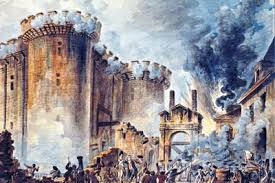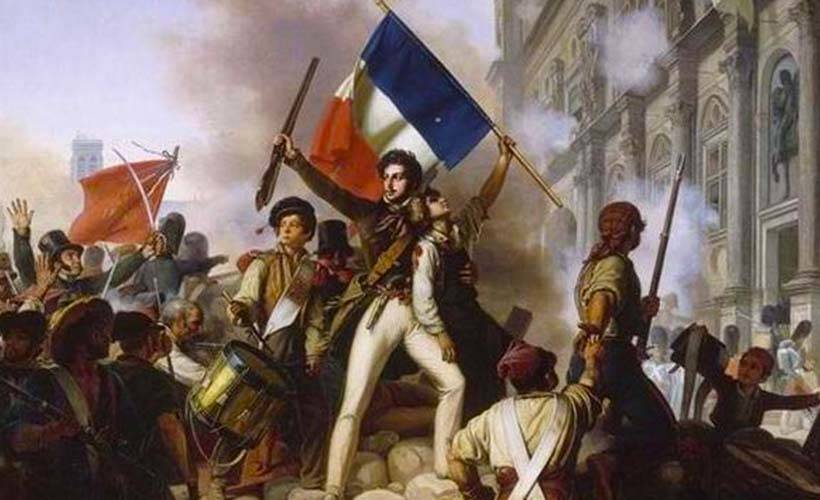Written History began in France with the invasion of the territory by the Romans, between 118 and 50 BC. Starting then, the territory which is today called France was part of the Roman Empire, and the Gauls, who lived there before Roman invasions, became acculturated “Gallo-Romans”.
With the fall of the Roman empire, what was left were areas inhabited by descendants of intermarriages between Gallo-Romans and “barbaric” easterners.
The legacy of the Roman presence is still visible, particularly in the southern part of the country where Roman circuses are still used for bullfights and rock and roll shows.
 Some of the main roads still follow the routes originally traced 2,000 years ago, and the urban organisation of many old town centres still transcript the cardo and the decumanus of the former Roman camp (especially Paris). The other main legacy was the Catholic Church which can be, arguably, considered as the only remnant of the civilization of that time
Some of the main roads still follow the routes originally traced 2,000 years ago, and the urban organisation of many old town centres still transcript the cardo and the decumanus of the former Roman camp (especially Paris). The other main legacy was the Catholic Church which can be, arguably, considered as the only remnant of the civilization of that time
Clovis, who died in 511, is considered as the first French king although his realm was not much more than the area of the present Île de France, around Paris. Charlemagne, who was crowned emperor of the Holy Roman Empire in 800, was the first strong ruler.
He united under his rule territories which extend today in Belgium, Germany and Italy. His capital was Aix-la-Chapelle (now in Germany, known as Aachen).
The country was under attack by the Vikings who came from the north and navigated upstream the rivers to plunder the cities and abbeys, it was also under attack from the south by the Muslim Saracens who were established in Spain.
The Vikings were given a part of the territory (today’s Normandy) in 911 and melted fast in the feudal system. The Saracens were stopped in 732 in Poitiers by Charles Martel, grand father of Charlemagne, a rather rough warrior who was later painted as a national hero.
Starting with Charlemagne, a new society starts to settle, based on the personal links of feudalism. This era is named middle age. Although generally seen as an era of stagnation, it can more be described as a very complex mix of periods of economic and cultural developments, and recessions due to pandemic disease and wars.
In 987, Hughes Capet was crowned as king of France ; he is the root of the royal families who later governed France. In 1154 much of the western part of France went under English rule with the wedding of Alienor d’Aquitaine to Henry II.
Some kings of the Plantagenet dynasty are still buried in France, the most famous being Richard I, of Walter Scott’s fame, and his father Henry II, who lies in the Abbaye de Fontevraud.
The struggle between the English and French kings between 1337 and 1435 is known as the Hundred Years War and the most famous figure, considered as a national heroine, is Joan of Arc.
The beginning of the 16th century saw the end of the feudal system and the emergence of France as a “modern” state with its border relatively close to the present ones (Alsace, Corsica, Savoy, the Nice region weren’t yet French).
Louis XIV who was king from 1643 to 1715 (72 years) was probably the most powerful monarch of his time. French influence extended deep in western Europe, its language was used in the European courts and its culture was exported all over Europe.
That era and the following century also saw the expansion of France on the other continents. This started a whole series of wars with the other colonial empires, mainly England (later Britain) and Spain over the control of North America, the Caribbean, South American, Africa, and Southeast Asia.
The French Revolution started in 1789, leading to the overthrow of King Louis XVI of the House of Bourbon and the creation of the First French Republic. Although this period was also fertile in bloody excesses it was, and still is, a reference for many other liberation struggles.
In 1791, the other monarchies of Europe looked with outrage at the revolution and its upheavals, and considered whether they should intervene, either in support of the deposed King Louis XVI, or to prevent the spread of revolution, or to take advantage of the chaos in France.
The French Revolutionary Wars were a series of major conflicts fought between the French Republic and several European Monarchies from 1792 to 1802.
1905 saw the separation of the Church from the State. This was a traumatic process, especially in rural areas. The French state carefully avoids any religious recognition.
The First World War (1914-1918) was a disaster for France, even though the country was ultimately a victor. At first many welcomed the war to avenge the humiliation of defeat and loss of territory to Germany following the Franco-Prussian War.
However very high losses and almost no gain on the Western Front change opinions of the war. A significant part of the male workforce was killed or disabled and a large part of the country and industry destroyed. When the Second World War (1939-45) was declared there was little enthusiasm and much dread in France at the prospect of enduring another major war.
In the spring of 1940 Hitler’s army invaded France, the army and government of the Third French Republic collapse and France surrendered in June of 1940. With British troops fleeing France an atmosphere of humiliation and defeat swept over the country. On the other hand, the French Resistance conducted sabotage operations inside German-occupied France. To support the Allied invasion of Normandy in June 1944, various groups increased their sabotage and guerilla attacks.
Since the end of WWII France went through a period of reconstruction and prosperity came back with the development of industry. The Fifth Republic (1958-to the present) emerged from the collapse of the French Fourth Republic (1946-58) and replaced the prior parliamentary government with a semi-presidential system. It is France’s third-longest-enduring political regime, after the pre-French Revolution Ancien Régime and the Third Republic.
Although France is extremely safe, anyone from an openly religious, faith community may still need to exercise care when travelling in France.







































